Embarking on a journey to lose weight can be confusing, especially with all the diets that exist. One way to consume food has become extremely popular in the past few years is Intermittent Fasting (IF).
I’ve been doing it for three years now, and the first thing I asked myself back then was: Will intermittent fasting help me lose weight?
After doing my research I’m convinced to say: absolutely! It is pretty clear by now that calorie restriction, in general, helps weight loss, especially when coupled with exercise and an overall healthy lifestyle. While intermittent fasting isn’t a diet that has you counting calories unless you’re doing the 5:2 variant, you will end up eating less throughout the day. And through that, you will lose weight. But there are some mistakes that you might find yourself making. In this Intermittent Fasting 101, we will take a look at what those mistakes are and how you can avoid them, to score the best possible results.
The different methods of intermittent fasting
There are several methods in which you can do it, of which the first three are more common compared to the other three. While all have the same goals, the methods can vary in difficulty and how fast you see results.
01
16/8 – LeanGains
In this approach, breakfast is skipped while restricting yourself to the 8 hour eating periods like 12 pm – 8 pm. Then there is a 16 hour fasting period in between or afterward. I like this method because you avoid eating any late-night-snacks after 8 pm.
Many people consider the 16/8 method to be the simplest, most sustainable, and easiest method to follow. It is also without a doubt the most popular.

02
5/2 Fast Diet
In this method, you consume very few calories. Usually about 500-800 for 2 days of the week and eat normally during the other 5 days. While it doesn’t matter on which day you consume fewer calories, you need at least one normal eating day in between.
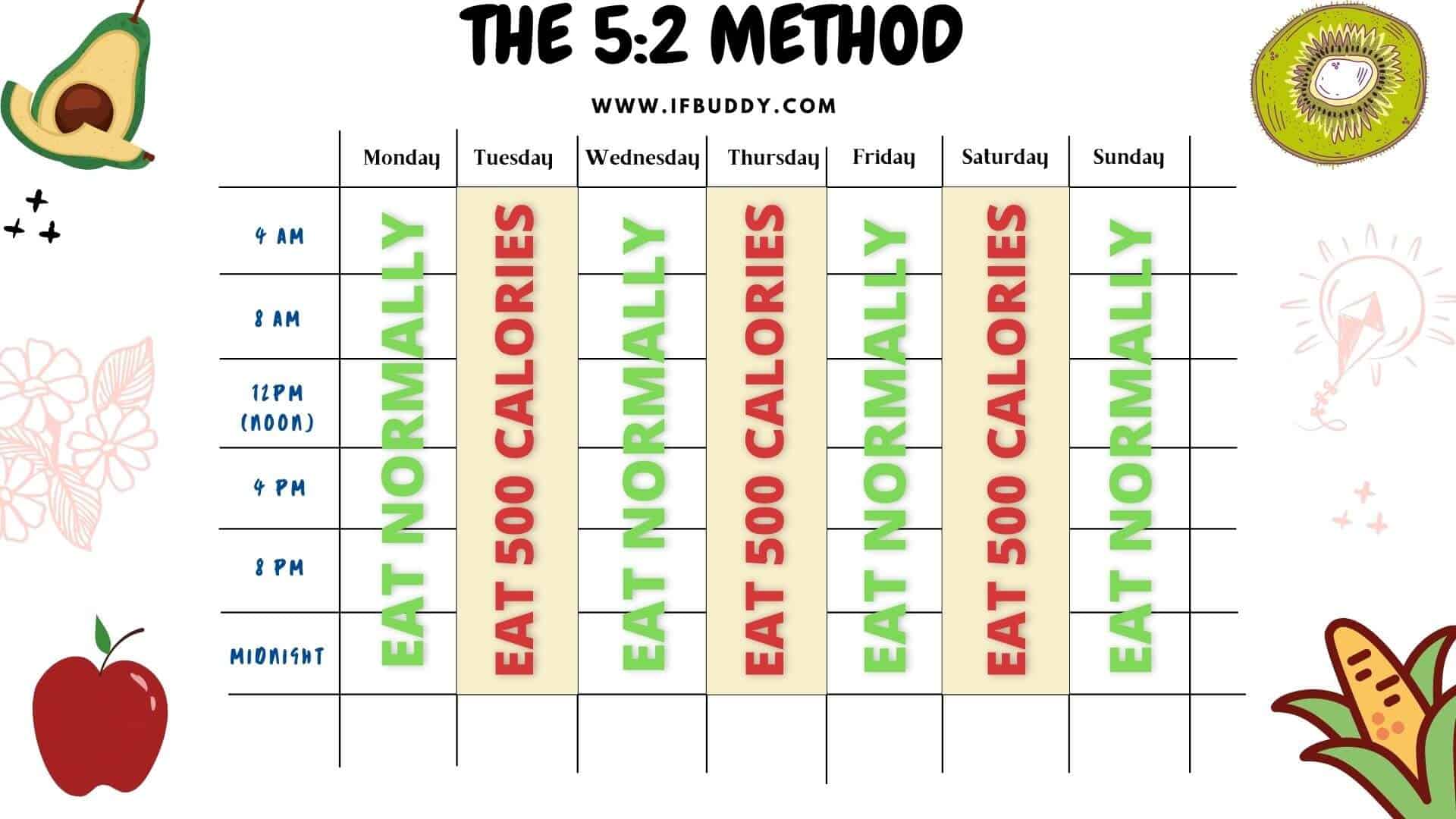
03
Eat-Stop-Eat
In this strategy, you fast once or twice a week for 24 hours and then eat again for the remaining days. However, this does not mean that you can now go back to your favorite fast-food stores. You will see better results if you continue to make good decisions about eating.
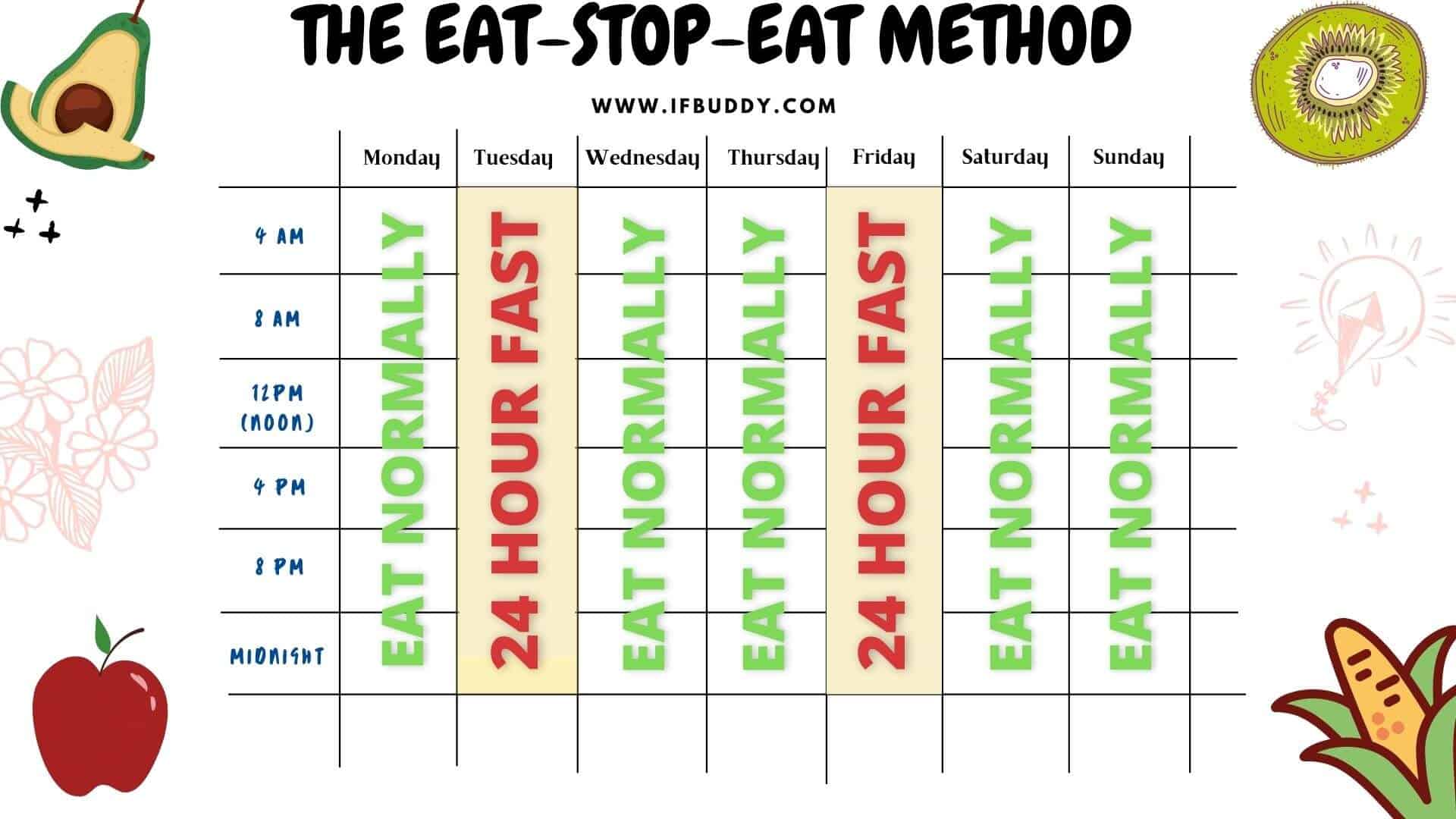
04
23/1 One Meal a Day (OMAD)
While doing this technique, you restrict yourself to eat only one meal a day. So you fast 23 hours a day and consume food in a one hour window. A lot of people eating only One Meal a Day support this with reporting rapid weight loss. Except for the hunger that you will have, it is pretty easy to follow, since you can eat pretty much anything you want during your eating window.
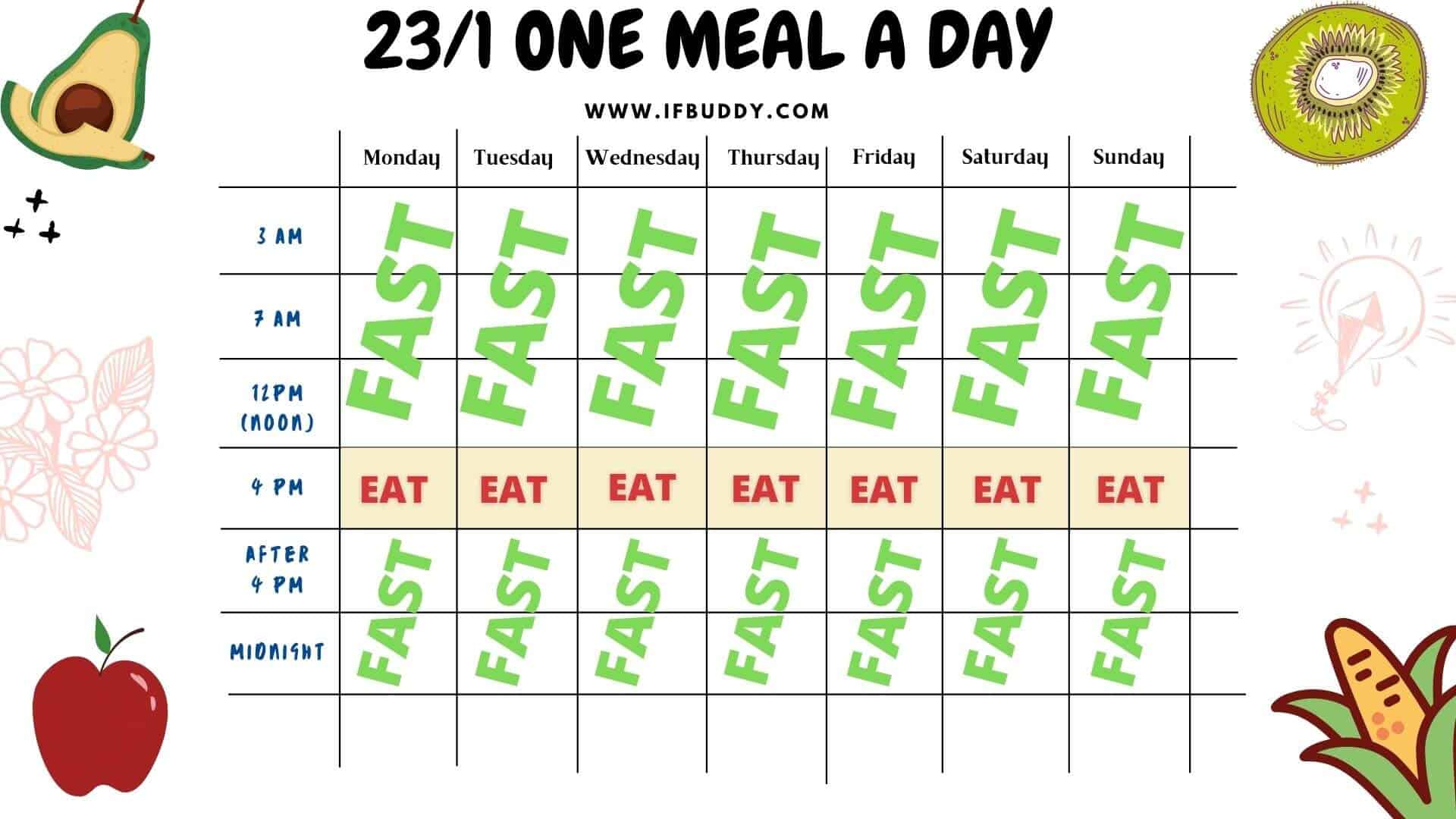
05
ADF Alternate Day Fasting
This is similar to the Eat-Stop-Eat method, but instead, you fast for one day and then eat the next day. The cool thing is that you can eat anything you want on the eating day.
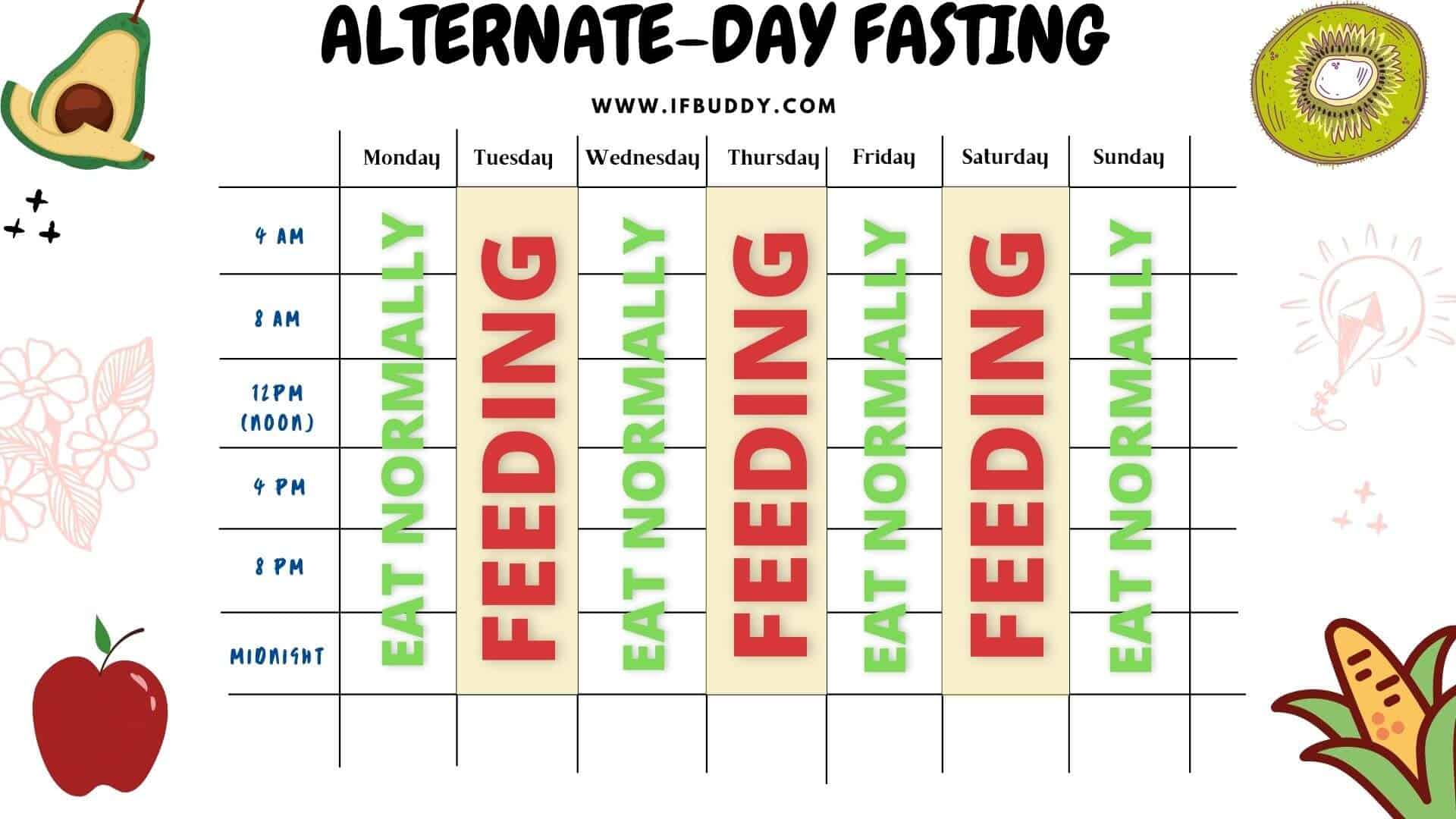
Which intermittent fasting method is the most effective?
I know this is not the answer you want, but I guess the only correct one is: it depends.
Being on a very harsh approach, for example, alternating between fasting and eating, you might see better results in terms of weight loss, but for long term benefits, it might not work. This is because you simply can‘t do it for a long time. It takes a lot of endurance to achieve the results you are striving for.
When we’re talking about doing IF, we talk about a change of lifestyle. This is a commitment that might be hard to follow for some people, but just like anything else, you just have to get used to it. Doing IF won’t give you results in a week – it is something you have to do for a long time, but I guarantee you, you will see your results.
How healthy is intermittent fasting?
Intermittent fasting comes with a very promising list of health benefits.
Boosts weight and fat loss
As mentioned before, it supports weight and fat loss, mainly because you eat less during the day. It is still not proven, that you can lose more weight with Intermittent Fasting than with normal calorie restriction (counting calories). Mainly because there are no long term studies that have researched this debate.
A study in 2018 found that intermittent fasting for weight loss is not better than a conventional calorie restriction. The study of 150 overweight people divided the participants into different groups. One group followed the 5:2 method of intermittent fasting, while another group had a daily calorie deficit of 20%.
After 50 weeks the values of the two groups were compared and it was recognized that there was almost no difference. In both groups, the new eating behavior led to a significant loss of weight and fat. But the intermittent fasting was not more effective than a conventional diet in terms of weight loss.
But if you look at the plateau effect of the insulin resistance, there was a significant difference. The insulin resistance, as well as obesity, went up again for the group following a calorie restriction diet. For the other group, following IF, the insulin levels didn’t go up again. Actually the opposite, if continued to go down.
It can reduce insulin resistance and lower the risk of type 2 diabetes.
IF reduces fasting insulin levels by up to 31% and lowers blood sugar by 3-6%, which can reduce the risk of diabetes.
It can reduce inflammation and oxidative stress.
Oxidative stress is one of the main causes of chronic illness, while inflammation can lead to issues such as joint pain, chronic fatigue, lower immunity, and even autoimmune diseases. Studies have proven that intermittent fasting has immense benefits in this area, reducing both oxidative stress and inflammation.

Extended life span
Although evidence in humans is limited, some animal studies have found that intermittent fasting can extend longevity.
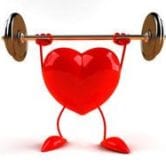
It can improve cardiovascular health
While you may be used to hearing that for good cardiovascular health you need fitness and any exercise in general, true health always starts with your diet.
How can intermittent fasting help? Simple. It can lower blood pressure. LDL cholesterol, triglycerides, inflammation, and blood sugar levels. As shown in a 2014 study All of these are major contributors to heart disease. So, by lowering them. You decrease your risk of developing such conditions.
The downsides
While this eating method has brought on a lot of attention towards itself, we shouldn’t overlook the fact that it has some downsides as well. Some of the side effects can decrease after the body gets more used to fasting.
- Intermittent fasting leads to mitigated physical activity as you starve through most of your day. You will end up feeling weak and this will lead to reduced physical activity.
- If you are on medication, it is pertinent to take your prescriptions. As most medications need to be taken with food, managing this eating pattern can get extremely challenging. If you just need to take in one pill a day, you can still make IF – just not all methods.
- Facing extreme hunger when you are taking on intermittent fasting is inevitable. And believe me: it will even increase when you’re around people who are consuming typical everyday meals or snacks
Why Intermittent Fasting may not work for you
For me, IF has been extremely valuable. It’s such an effective way of controlling your appetite and stop binge eating. But at the end of the day, it comes down to two things: Calories and Nutrition. It doesn’t matter which of the above mentioned IF-Methods you follow. If you don’t eat the right amount of calories or eat unhealthy foods in your eating-period, you’re not going to see results.
Overeating
“Listen to your body, not your time schedule.”
In my research, I found out that a lot of people struggle with this problem in the beginning. IF can be very emotional and you might see yourself counting the hours until you allow yourself to eat. This can become a big trap since you find yourself eating instantly when it is time. Instead, you should stick to the eating patterns, but listen to your body. You will know when you actually need to eat.
Undereating
“I’m not allowed to overeat? Easy, I’ll just eat much less calories.”
While undereating is less common than overeating, this can be just as bad. Undereating can slow down your metabolism which can make you gain weight. Yes. Gain!
This is because your body needs calories for energy. (Exercising, Walking, Thinking, Pushing Blood, and much more)
The wrong IF method
There are certain times where it is just not healthy for certain types of IF. For example, if you work on a construction site and follow the 16/8 method. You have to lift heavy items and work in the sun, but you can’t eat anything, since you’re only allowed to eat after 12 pm. Being on a fast makes you hungry, which will then influence physical activity badly. This could really mess up your career.
You should try the 5/2 method instead, where you eat under 1000 calories on the weekend and normal during the week.
You’re eating the wrong foods
“Well, I’m fasting, so I guess I can go eat fast food this week.”
Just because you restrict when you eat, doesn’t mean you can decide what you eat. All the efforts and sacrifices you made by fasting will be quickly wasted because you made the wrong food choices. Try to limit yourself to one cheat meal in a week.
Who shouldn’t be doing Intermittent Fasting?
Pregnant women
Although there are not many studies to support this, intermittent fasting is not recommended for pregnant women. This is simply because you have a lower blood sugar level, which, in combination with being pregnant can lead to dizziness and fainting.
There have been studies for fasting in Ramadan (the fasting month of Muslims). Studies recommend abstaining from Ramadan fasting during and after the pregnancy.
Women that are breastfeeding
Again, there are no studies in combination with intermittent fasting. But generally speaking, it’s probably safe to say: don’t do it. As a breastfeeding mom, you have to feed your little one, as well as yourself. When you’re breastfeeding, you normally need around 500 extra calories every day. There are factors that can cause these numbers to vary greatly. For example your size and your overall activity level.
To be on the safe side, you shouldn’t do IF and breastfeed. But if you want a good answer, ask your doctor.
Underweight people
People that struggle with gaining weight should probably not try intermittent fasting.
While technically speaking it is possible, because IF does not mean being in a calorie deficit. You can easily eat your calorie need, but it might be hard to do so for some people. You might be able to easily lose 5 lbs (2.2 kg) in a day, but you can’t put it back on so fast.
People with certain conditions (such as diabetes)
If you are dependent on medication, possibly even several times a day, you should discuss Intermittent Fasting with your doctor. This is because many medications must be taken with food. (Can You Take Medicine While Intermittent Fasting?)
If you take medication for diabetes, especially insulin, it can become very dangerous. Insulin has an effect on blood sugar during fasting, so it can drop very rapidly. Especially as a diabetic, it is advised to always maintain a stable blood sugar level.
Therefore, IF is considered unsafe for diabetics and you should definitely get medical advice from your doctor before starting any fast.
Teens (in some cases)
Practicing conventional diets as a teen could lead to eating disorders since your body is still developing. Following these diets could also lead to changes in blood sugar levels, fatigue, or a lack of concentration.
Intermittent Fasting is different from that. It can give a teenager all the benefits it needs in the fasting window, while still filling the body with the required calories in the feeding window.
If you’re a teenager (or have one) considering to do intermittent fasting, I wrote an in-depth article about its safety. Make sure to read it before starting your new eating routine.
How to fight against hunger during Intermittent Fasting
What really helps me, is to drink A lot of water. Sometimes I get hungry, drink a glass of water, and then think “Oh, I was just thirsty”. It is actually crazy how water can make you feel full, so it is a very valuable thing for a successful fast.
Also, to stimulate the feeling of eating, I eat a lot of sugar-free gum. I have a pack of gum literally everywhere I go, and whenever I have gum in my mouth, I feel so much less hungry.
Another important thing to add is, that the feeling of hunger is temporary. You won’t feel hungry at 10 am and then have to until you break your fast. It won’t get worse by the hour. Most of the time you will feel hungry for 20 minutes and then forget about it. If you’re at work or in the school you probably won’t feel it anymore, since your body quickly adapts to it. While you may be more focused on hunger at the beginning, this will more and more become less of a thing once you’re doing IF for some weeks.
There are other simple tips to make Intermittent Fasting easier – here are 10 of them.
Why do we lose weight when we fast?
Intermittent fasting shows promise for the treatment of obesity.
The first hours of fasting are normal for most people, as the body goes through the regular process of glycogen breakdown and storage of glucose as an energy source. Normally, about 25% of it goes directly to the brain, while the rest supports the red blood cells and muscles.
After about 8 hours of fasting, the liver uses up the last glucose reserves. At this point, the body enters a state called gluconeogenesis, which marks the body’s transition to the fasting mode. Studies have shown that gluconeogenesis increases the number of calories burned by the body. Since no carbohydrates are consumed, the body forms its own glucose mainly from fat.
To date, the studies have been small and of short duration. Longer-term research is needed to understand the sustainable role IF can play in weight loss. But from my own experience, I can say that IF does work very well.
Intermittent Fasting and Exercising
Should I be working out in the morning while Intermittent Fasting?
Yes, you definitely should! But don’t do anything too intense. Working out intensely on an empty stomach can make you feel dizzy and might even make you faint. I find it easier to work out in the morning when I drink a lot of water first.
A study published in 2019 compared working out in a fasted state and working out in a fed state. They proved, that working out fasted promotes reliance on burning fat for fuel. This effect was not seen, when the participants consumed a high-carb breakfast right before the exercise. Note, that both groups burned the same amount of calories – just the energy from where it came from was different. Furthermore, insulin was more efficient and effective when people did not consume breakfast before exercising. Another study implies, that when you’re in a fasted state, blood flow in the abdominal region is increased. This will lead to an insane loss of belly fat, especially when combined with HIIT.
Lifting heavy weights on an empty stomach
You might ask yourself if you should lift weights during the fast period. Science shows that there are benefits to fasted training as well as benefits to fed training. So I recommend that you stick to what fits in your schedule. Just be aware that in case you exercise in the fasted state, a post-workout meal (or a whey protein shake) becomes of greater importance. This is because you need to minimize the chance of muscle breakdown. Again, if you feel discomfort, dizzy or faint, you should go ahead and break your fast and definitely eat something.
Taking 10g of BCAAs can help you fuel your workouts and avoid any side effects. Personally, I use them myself and take them in pill forms before my morning workout. I’ve made a list of the best BCAAs that won’t break your fast, in case you want to buy some.
When do you see results with Intermittent Fasting?
This highly depends, as everyone starts their initial weight. If you are more obese, you will see results after a few weeks. Experts suggest waiting at least 12 weeks to look for any results from your new feeding pattern.
There are various factors that can speed your weight loss up:
- Removing junk food and alcohol, replacing them with fresh vegetables and fruit (with water to drink) will deliver much faster results.
- You don’t take any cheat meals, etc. as they will sabotage your progress.
- Implementing working out alongside fasting will speed your progress up (preferably you should workout in a fasted state)
Won’t Intermittent Fasting make me lose muscle?
This has been a big concern by so many people, and especially when researching new topics I see this question a lot. But I don’t blame these people, because some opponents of IF have started the rumor, that you lose muscle mass each day you fast. This is true if intermittent fasting is not done right. For example, if you undereat. Since I’m an active faster for over three years now and I visit the gym regularly, I can confirm that this is absolute nonsense.
It doesn’t matter if you eat for 8 hours or 16 hours a day. You just need to reach your daily protein goal, just like on normal eating days. If you’re able to do that, you shouldn’t be losing muscles. Still, make sure not to lift heavy on an empty stomach, or at least take BCAAs before you do that.
Should a skinny fat person do intermittent fasting?
Skinny fat is a popular term that described those who are thin but still have plenty of fat on their body. It is most common with people who never seem to put on much weight, no matter what they eat or how much they exercise. Now intermittent fasting can help you lose fat, but also weight. Because you are skinny fat, you only want to lose fat, not weight. This is why you have to manipulate your macros to make sure you eat lots of proteins and eat fewer carbs. To that you can add a good workout routine, focusing on building muscle.
If you are skinny fat: The topic is too broad to include it into this Intermittent Fasting 101. That’s why I wrote an in-depth article, explaining how you can include intermittent fasting into your day.
Check it out: Should a skinny fat person do Intermittent Fasting?
Does Intermittent Fasting help your skin?
The benefits of intermittent fasting for your skin are proven through legitimate scientific studies that prove your body is at its peak potential for rebuilding damaged skin cells. This is why so many people are trying to lose weight using this method.
Tightens the skin
According to researchers, Intermittent Fasting does tighten your skin. It reduces the metabolites that lead to aging skin, wrinkles and sagging. Other research confirms that when done correctly, restricting calories through intermittent fasting helps skin cells to regenerate more effectively, and wrinkles begin to smooth giving your skin a more youthful appearance.
Check out this post if you are trying to tighten your skin: Does Intermittent Fasting Tighten the Skin?
Helps acne
Diet in and of itself can cause acne. For instance, sugar and low-fat dairy have been linked to cystic acne. If the foods you consume are correct though, intermittent fasting shouldn’t cause acne. Intermittent fasting helps by reducing inflammatory proteins from the body. As a result, your immune system should have normal reactions to pimples, and your acne should diminish in time.
As we all know, sleeping and healthy skin go hand in hand. The saying “beauty sleep” exists for a reason! Since intermittent fasting also helps to improve your sleep, it will help with less inflammation and cortisol.
If you want to improve your acne or if you get a few pimples every now and then, make sure to check out my post about IF and acne: Can Intermittent Fasting Cause Acne?
Who started this trend?
Intermittent Fasting was first introduced by Martin Berkhan. He had previously used the model with his customers and in 2010 he wrote a blog post about it on his website leangains.com. I find Berkhan a very inspiring person, which is why I wrote an entire article about him.
The history of fasting
Fasting is an ancient tradition that has been practiced by many cultures and religions over the centuries.
It can be practiced in different ways (e.g. complete, partial, or intermittent). Fasting has been used therapeutically since the 5th century B.C., explicitly since the Greek physician “Hippocrates” recommended abstinence from food and drink to patients who showed certain symptoms of illness. Already at that time, the natural loss of appetite was observed in patients in certain disease states.
In 1945, Anton J. Carlson and Frederick Hoelzel of the University of Chicago found both an extension of life span and a reduced tumor rate in rats fed intermittently. They determined the optimal fasting interval to be one day fasting in three days. The mean lifespan of the animals increased by 15% in females and by 20% in males.
What is allowed during the fast?
A general rule that you can stick to is, that you can need to stay under 50 calories before you break your fast. But this depends on factors like weight, size and can vary. Small doses of calories technically break your fast, but won’t affect your weight in any noticeable way. It was important to me to include the most liked beverages which you can consume into this Intermittent Fasting 101.
Coffee
Yes – your morning coffee at 8 a.m is allowed. And you don’t have to drink it black. A splash of milk is allowed – just make sure it is not too much, or you might get your insulin level too high and therefore break your fast.
Drinking coffee with cream though would technically break your fast. But if you are fasting for the sole purpose to lose fat and weight, breaking your fast won’t have a big impact on your results. The science behind this is simple: To lose fat and weight, you need to stay in a calorie deficit. By skipping breakfast you automatically consume fewer calories, which puts you in a deficit.
Coffee with cream would break your fast since it does contains some calories, but it won’t put you out of a deficit unless you’re drinking dozens.
If you’re cool with that, I’d recommend you check out my post about Dirty Fasting.
Tea
Tea is allowed in all varieties, but may not contain sugar or sweeteners. Recommended are green tea, black tea, and herbal tea. In case you’re a tea lover, here are the 10 best teas to drink during your fast.
Water
It is always allowed (obviously), but I just want to point out again how important water is during fasting. Water is the key function of everything in your body, which is why it is recommended to drink about 11.5 cups (2.7 liters) for women and 15.5 cups (3.7 liters) for men. Sometimes during your fasting state, you might think too much about food, which is why you forget about drinking water.
Does taking medication break a fast?
Some medications are best absorbed with food, while others will severely irritate your stomach lining when taken on an empty stomach. Others, however, are best absorbed when taken in a fasted state. Some medications will cause you to break your fast even if you don’t take them with food usually due to their impact on your insulin levels. However, it is safe to say most of them won’t have this effect. In the end, especially when dealing with prescription medication, be sure to check with a doctor if you can take it while fasting. Also, read the full article about taking medications while fasting.
Intermittent Fasting Meal Plan
When breaking our fast, you should make sure to never choose unhealthy foods to do so. Always have your focus on a healthy, filling meal. So choosing whole foods, like vegetables or raw fruits is generally a good choice. I never really had a clue what would look like a healthy meal plan, which is why I really wanted to include one into this Intermittent Fasting 101.
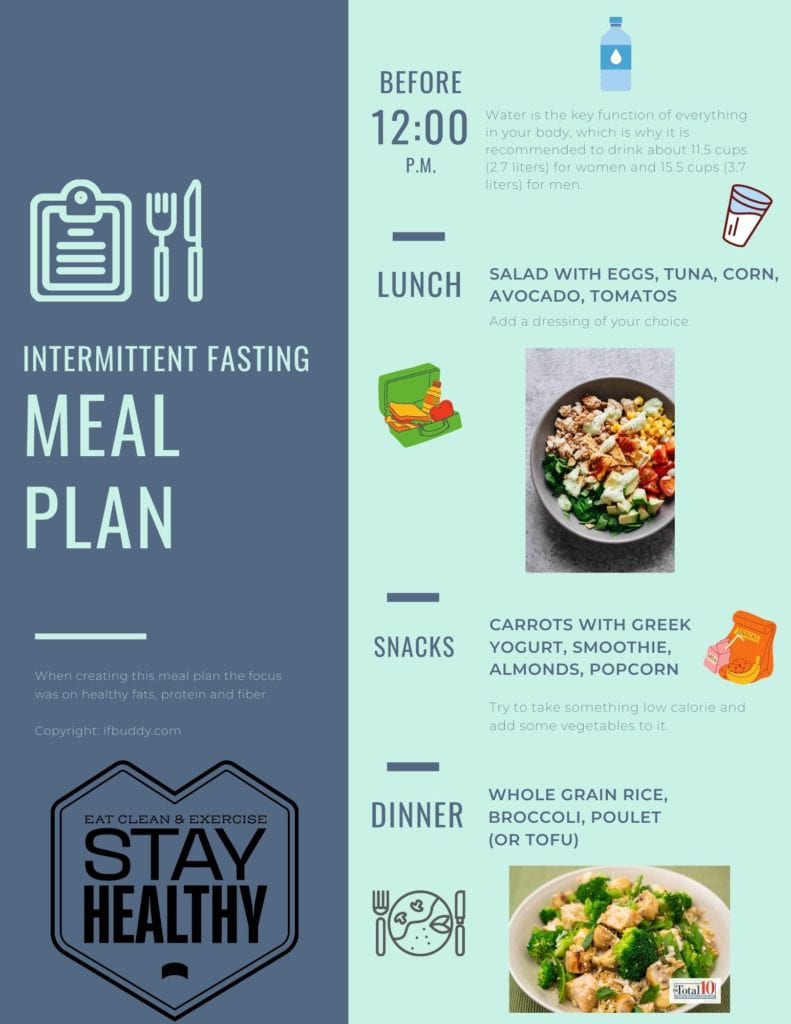
My intermittent fasting journey
In the year 2017, I came across the term “Intermittent Fasting” for the first time through the internet. I became curious and informed myself further. I came across an Intermittent Fasting 101 and decided to give it a shot.
The concept of skipping breakfast, thus not consuming any calories for several hours and then eating food again within a certain period sounded relatively promising.
Back then I was about 150 pounds (68 kg) and I wanted to lose 2.2 pounds (5 kg). After only a few weeks I reached my goal. However, in the beginning, I misinterpreted the idea of IF. Many people think that during the hours in which you’re allowed to eat, one can also take in more unhealthy calories – and that this is compensated by fasting. But this is not the case! Healthy nutrition is still expected as with a conventional diet.
Conclusion
Intermittent fasting has amazing benefits for health and can help you lose weight quickly and safely, without many of the risks associated with other calorie restriction diets. IF will help you lose bodyweight, regardless of the method you choose. The important thing is, that you stick to the guidelines, and if you do, you will see results in no time. I hope I included all the important things into this Intermittent Fasting 101. And in case you have any questions, feel free to leave a comment!
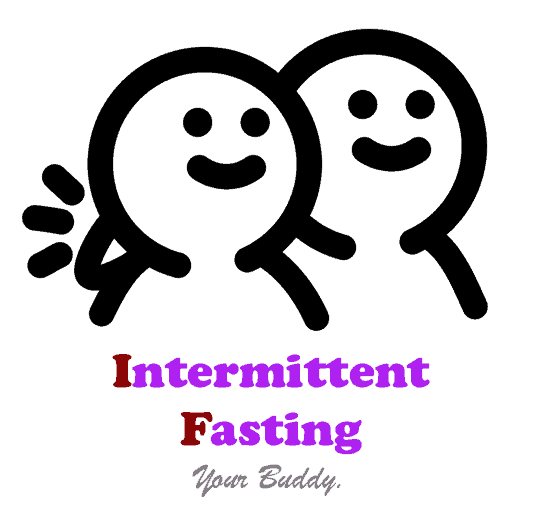
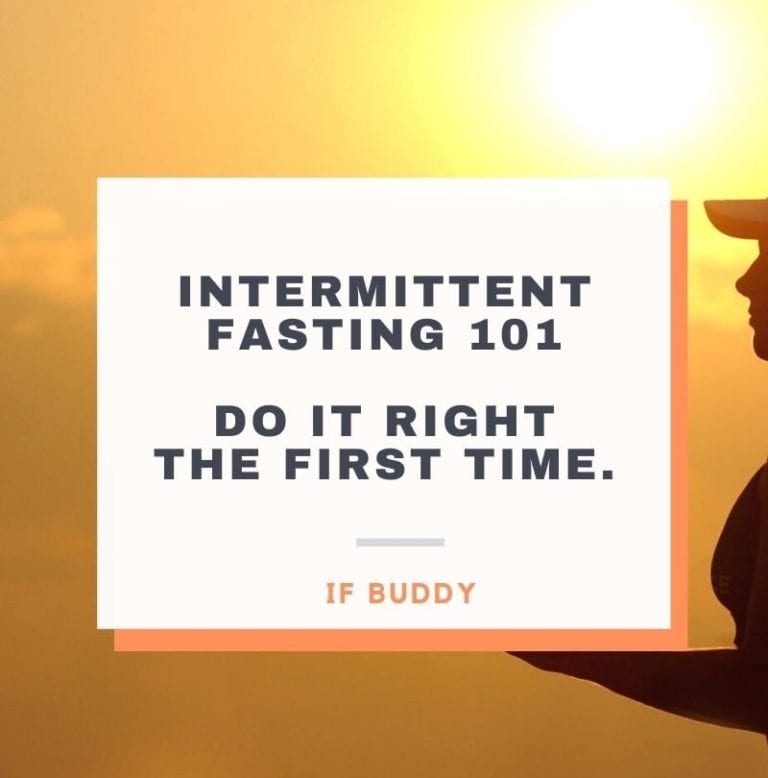

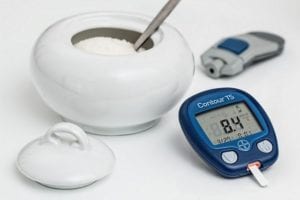
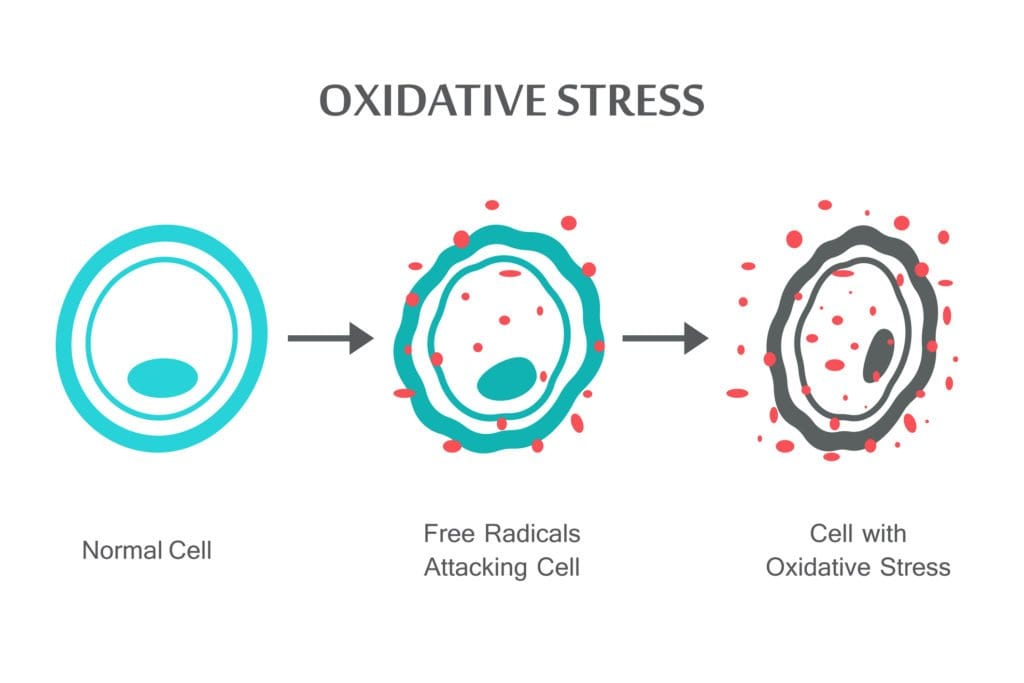
6 thoughts on “Intermittent Fasting 101 – The Ultimate Guide to a Successfull Weight Loss Journey”